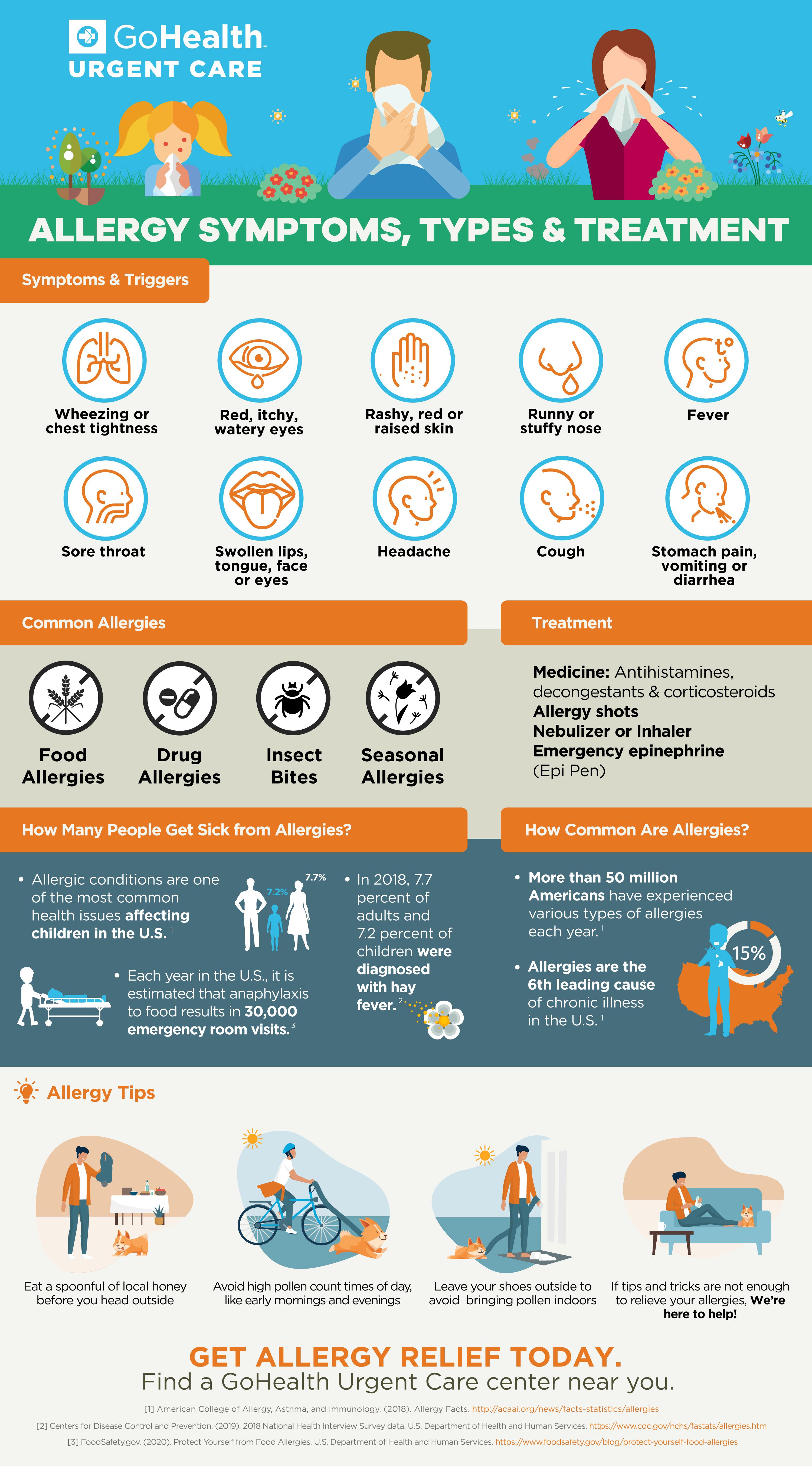Allergy attacks and allergic reactions: Know when to seek urgent care
Medically reviewed by Dr. Betsy Koickel, MD on July 9th, 2025.
Allergy sufferers can have many potential triggers, whether it’s increased pollution outside, the spread of germs from their kids or the annual cold and flu season. While some allergy types may cause mildly annoying and bothersome symptoms, such as a stuffy or runny nose, some allergic reactions can be life-threatening, depending on the individual and their specific triggers.
It’s important to know the difference between what’s normal, what’s concerning and when to seek urgent care for allergies.

The allergic response
The job of a healthy immune system is to recognize foreign substances and summon resources, such as white blood cells, to destroy them. However, sometimes this system malfunctions, causing an allergic reaction.
First, let’s examine the basics of how the allergic response works in the body. This reaction begins when the immune system mistakenly identifies a typically harmless substance, like pollen or food, as a threat.
In response, it produces antibodies called IgE, which bind to immune cells known as mast cells and basophils. When these cells are exposed to the allergen again in the future, they release chemicals such as histamine, which causes symptoms like itching, swelling, and inflammation.
This overreaction can range from mild symptoms for some people to severe, life-threatening reactions like anaphylaxis — which require immediate medical attention — in others.
Types of allergies
People can be allergic to almost anything, including things we’re exposed to in our environments or things we ingest. The following are some of the most common allergies:
Food
Many people are allergic to certain foods; some are merely sensitive and do not experience a true immune response. Sensitivity may occur when a person lacks the necessary enzyme to break down a specific protein, as in lactose intolerance (a condition related to dairy), which can lead to stomach pain or cramping.
In a true food allergy, consuming the food triggers an immune response, leading to allergic symptoms such as swelling of the airways (which can result in difficulty breathing) or a rash. Some of the most common food allergies include milk, eggs, wheat, nuts, fish and shellfish, casein (a protein found in milk), soy and sulfites.
Environmental substances
Although we associate seasonal allergies with springtime, they can occur all year long, especially in the Fall, for some unlucky individuals--those who experience different allergies to different substances depending on the time of year.
Pollen, dust, grass and oak are common seasonal allergens. Allergic rhinitis, often called hay fever, is a reaction to grains, pollen and other substances that may occur during a certain season (seasonal) or all year long (perennial).
Pets and animal dander
Many households have a pet or two, and allergies to cats and dogs are very common. Pet allergies are caused by dander released from the animal’s skin (or feathers).
Insects
Fire ants, bees, wasps and hornets are the most likely stinging insects to cause an allergic reaction. Many people confuse the normal symptoms that occur after being stung with an allergic reaction, but an allergic reaction to an insect sting is often very severe.
In this case, one may experience more severe symptoms, such as swelling around the lips, eyes, and tongue; difficulty breathing; itching, cramping, or severe numbness; and dizziness or loss of consciousness, which will require a visit to the nearest health facility.
Medications
Any medication can cause an allergic reaction in an individual who is susceptible to it. For example, many people are allergic to penicillin, an antibiotic often prescribed to treat bacterial infections, such as strep throat, ear infections, and urinary tract infections.
This means their bodies react inappropriately to the presence of the antibiotic in their bloodstream, triggering an immune response that can cause symptoms such as dizziness, nausea, difficulty breathing, and hives.
Personal Care Products
Many people suffer an allergic reaction after being exposed to certain perfumes, shampoos, detergents, cleaning agents or creams. Because we use many chemicals in our daily lives, it can be challenging to identify the culprit.
Allergic signs and symptoms
Not everyone will respond to the same allergen in the same way. Some allergic reactions are relatively mild and localized, while others are severe and affect many different body systems.
The following are examples of how different body systems can be affected:
- Skin: redness, itching, swelling, scaling, blistering, weeping, crusting, hives, welts
- Respiratory system: a sensation of chest tightness, wheezing, coughing, feeling short of breath
- Cardiovascular system: rapid heart rate, low blood pressure (which can lead to shock in severe reactions), vasodilation
- Eyes, nose and throat: itching, watering and redness of the eyes, nasal congestion, swelling/soreness of the throat, hoarseness, sneezing, swelling of the area around the eyes
- Digestive system: stomach pain, nausea, vomiting, diarrhea
- Mental and general health: anxiety or a sense of impending doom (in anaphylaxis), fatigue
When to seek help
Many people wonder when they should seek urgent care for allergy treatment. A good rule of thumb is that it’s never a bad idea to seek medical attention if you are concerned about your health and well-being. It’s better to get checked out at an urgent care or emergency department and cleared than to wait and realize you’re in serious trouble at home.
An urgent care facility can help you identify the cause and manage the symptoms of non-severe, non-life-threatening allergic reactions. However, if your symptoms are severe and sudden, seek immediate medical attention from an emergency department, not an urgent care facility, as they may be a sign of anaphylaxis.
Anaphylaxis is a form of allergic reaction that is rapid, severe and life-threatening. Symptoms develop almost immediately, and without medical care, the person may die. Anaphylaxis can cause difficulty breathing due to swelling of the airways and a drop in blood pressure. Combined, these symptoms can lead to a state of shock.
Other symptoms and signs of an allergic reaction may also be present, such as hives, swelling and gastrointestinal symptoms. The treatment for anaphylaxis is epinephrine, a medication that causes blood vessels to constrict, thereby increasing blood pressure.
Some people who have experienced a severe allergic reaction carry an Epi-Pen (a syringe that contains a dose of epinephrine) so that they can administer the drug to themselves while waiting for emergency assistance.
If you or your loved one experiences any of the above symptoms of anaphylaxis, don’t wait to see if symptoms improve — go immediately to the nearest emergency department.
You should also seek medical care for allergies if you are experiencing a new rash, hives, or other allergy symptoms that are making you uncomfortable, even if these symptoms may not seem urgent.
If you’re dealing with pesky allergies or are concerned about how certain triggers may be affecting your health, an urgent care center can help address these issues. We can provide immediate relief for allergy attacks, as well as long-term care solutions and allergy tips to help you control your allergies. Find an urgent care center near you.


